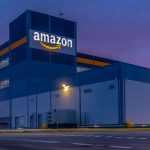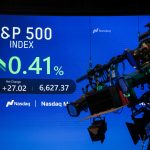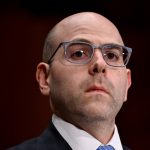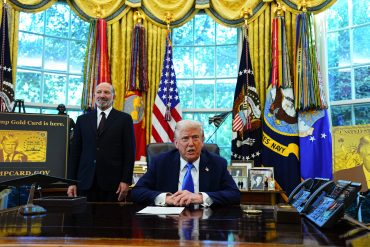
- H-1B Visas
- Policy & Regulation
- Workforce
H-1B Visa Fees Soar to $100K, Reshaping Global Tech Hiring
5 minute read

Tech sector H-1B visa fees spike to $100,000 as Indian IT companies accelerate workforce localization strategies
Key Takeaways
- Nifty IT index drops nearly 3% after U.S. government raises H-1B visa application fees to $100,000, with Tech Mahindra falling over 4% and Infosys declining as much as 4%
- Indian IT firms reduce H-1B dependency significantly with top companies now having between 20% and less than 50% reliance on these visas for North American operations, down from much higher levels a decade ago
- $100,000 fee applies only to new applications as one-time charge per petition, not renewals or existing visa holders, according to White House clarification
Introduction
Indian software stocks tumble as the Trump administration implements a dramatic increase in H-1B visa application fees, raising costs from roughly $2,000-$5,000 to $100,000 per new petition. The policy change strikes at the heart of India’s $245 billion IT services industry, which relies on skilled worker visas to serve clients in its largest market.
The fee hike creates immediate concerns about operational costs and competitive positioning for Indian technology companies. Market participants view this as another regulatory challenge facing an industry already grappling with artificial intelligence disruption and changing client demands.
Key Developments
The White House announced the substantial fee increase through a presidential proclamation, initially creating confusion about whether charges would apply annually or to visa renewals. Commerce Secretary Howard Lutnick’s initial comments suggested broader application of the fee structure.
Officials later clarified that the $100,000 charge represents a one-time fee for new H-1B visa petitions only. Current visa holders and renewal applications remain exempt under existing regulations, addressing immediate concerns about widespread workforce disruption.
The policy change affects H-1B visas that allow U.S. firms to hire foreign workers in specialty fields including STEM and information technology. These visas serve as crucial pathways for Indian engineers to work on client projects in the United States.
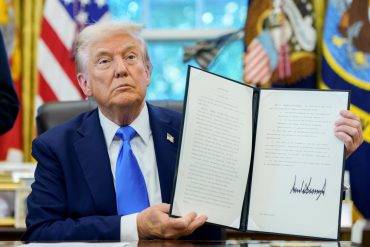
Market Impact
Indian software stocks experience sharp declines following the announcement, with the Nifty IT index falling nearly 3% while broader markets remain stable. Tech Mahindra leads the downturn with losses exceeding 4%, followed by Infosys shares dropping as much as 4%.
Tata Consultancy Services shares decline 2.5%, while Wipro and HCL Technologies each fall approximately 2%. The selling pressure reflects investor concerns about margin compression and operational adjustments required by the policy change. The technology sector significantly underperforms other market segments as investors assess the financial impact of higher visa costs.
Strategic Insights
Major Indian IT companies demonstrate reduced vulnerability to H-1B policy changes compared to previous years. Leading firms now deploy between 20% and 50% of their North American workforce through these visas, representing substantial decreases from historical dependency levels.
Companies accelerate strategies to mitigate visa-related risks through increased local hiring in the United States. This shift includes expanding recruitment of American workers and establishing delivery centers in near-shore locations including Canada and Latin America.
The policy change reinforces existing trends toward offshoring and automation adoption. Firms invest in Global Capability Centers and digital transformation initiatives to reduce dependence on visa-dependent workforce models while maintaining service quality.
Expert Opinions and Data
Industry data reveals H-1B dependency among top Indian IT firms dropped 56% between fiscal years 2015 and 2023. The seven largest companies received only 6,700 approved petitions in fiscal 2023, demonstrating successful diversification efforts.
Pareek Jain of EIIRTrend expects “short-term disruption and margin pressure for Indian IT” from the fee increase. However, he notes that medium-term stabilization appears likely through offshoring, nearshoring, and AI adoption strategies.
H-1B approval rates reached 98.4% in 2024, the highest level since 2021, indicating continued strong demand for specialized technology talent. Applications increased 3.1% in 2024 while approvals rose 4% and denials dropped 32.5%.
Infosys reports over 60% of its U.S. workforce now consists of local hires, with H-1B dependency declining from roughly 30% to 24% in fiscal 2025. TCS hires more than 50% of its American workforce locally while processing only 3,000-4,000 H-1B visas annually.
Conclusion
The H-1B fee increase creates immediate financial pressure on Indian IT companies while accelerating longer-term workforce localization strategies. Market reactions reflect concerns about margin compression and operational adjustments required to maintain competitiveness in the U.S. market.
Indian technology firms demonstrate greater resilience to visa policy changes than in previous years through diversified hiring practices and reduced dependency ratios. The industry’s adaptation strategies, including increased automation and offshore delivery capabilities, position companies to manage regulatory challenges while serving client demands effectively.

